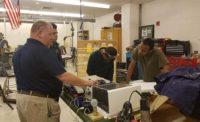
An elementary school in Saldang, Nepal, has electricity for the first time ever, thanks to Hartford Public High School's Academy of Engineering and Green Technology. A group of students designed a solar-powered wind turbine, which was then transported 11,000 miles from Connecticut to the remote Himalayan village to provide the school with heated classrooms and energy to power laptops.
Located at an altitude of nearly 13,000 ft, the school is accessible only by yak and closed between October and April. Connecticut philanthropist Peter Werth learned of the school's challenges on a trip to Nepal and approached Bruce Dixon, CEO of the Connecticut Pre-Engineering Program, who suggested the Hartford school for the project. Also providing support was the Connecticut Business and Industry Association.
"Peter thought that an alternative energy system could provide them with electricity and wanted students in his home state to have the opportunity to design and build the system," says science teacher David Mangus, also named the school's teacher of the year. Mangus' class did the preliminary research on off-grid energy sources and environmental and cultural impacts. A group of students was selected to continue with the project through the summer. They came up with a customized generator system that includes the wind turbine and solar panels.
The eight seniors found that participating made them more confident in their abilities, strengthened their work ethic and has pushed several toward studying engineering in college. "This project made me want to get more interested in mechanical engineering," says Derrick Cardona, one of the participants. "I learned how to not give up when challenges come up. It also made me a better person in school and at home." Isiah Cabrera agrees. "I focus better than I did last year," he says. "The project also helped me realize that my ideas matter when I'm working in a group and to speak up when I have an idea."
Principal Mike Maziarz says the project "changed the lives" of the participants. "Seven of the eight students made honor roll this marking period, and all want to attend college. They did not all have that goal before," he says. "The project has made them more serious about their schoolwork and lives and has focused their efforts." Not just the current group will benefit. "This will help to provide future projects for other students in our academy to benefit from the experience, as well. Students have become personally invested in the welfare of others, in their community and in their part in making the world a better place. As an educator, there's nothing more I could ask for."




